5-point checklist for a sustainable safari
During this time when travel has been halted across the world, we have an opportunity to reflect on why travel to Africa is important to us and how we can continue to do so, without harming the environment and people that live within the safari destinations we visit.
There is an almost endless list of inspirational quotes by famous people throughout the centuries that speak to the long-lasting effect, benefit and influence travel has in our lives. The current travel bans not only effect the ones doing the travelling though. Wildlife conservation and anti-poaching initiatives are losing funds that come from the African safari industry. Local economies that rely heavily on tourism in Africa are also losing their main revenue stream. On the flipside, we also hear how natural rejuvenation is unfolding in wild spaces – and even in urban cities – because of reduced human presence.
 Considering this, we can decide now to become more responsible travellers when local and international travel bans are lifted. Once we can freely and safely experience Africa again, we can choose a sustainable safari approach that supports community empowerment, economic development and wildlife conservation, while only leaving a minimal to zero negative environmental footprint behind.
This all too shall pass, so we encourage you to stay inspired about your next trip to Africa. We have put together a five-point checklist that, with each tick, will get you closer to experiencing a more sustainable safari.
Find a tour operator focused on responsible travel
Many people have been incorporating sustainability into their travel style for many years now. One of the best ways to get started on the right path is by choosing a reputable tour operator that is strongly aligned to the principles of responsible tourism. The company’s passion for Africa’s health and its ability to thrive environmentally, socially and financially will shine through in the company’s ethos from the outset.
Considering this, we can decide now to become more responsible travellers when local and international travel bans are lifted. Once we can freely and safely experience Africa again, we can choose a sustainable safari approach that supports community empowerment, economic development and wildlife conservation, while only leaving a minimal to zero negative environmental footprint behind.
This all too shall pass, so we encourage you to stay inspired about your next trip to Africa. We have put together a five-point checklist that, with each tick, will get you closer to experiencing a more sustainable safari.
Find a tour operator focused on responsible travel
Many people have been incorporating sustainability into their travel style for many years now. One of the best ways to get started on the right path is by choosing a reputable tour operator that is strongly aligned to the principles of responsible tourism. The company’s passion for Africa’s health and its ability to thrive environmentally, socially and financially will shine through in the company’s ethos from the outset.
 If done correctly, they will create a safari experience that is unforgettable for all the right reasons, both for you and those you visit. Your trip will bring substantial and long-lasting value to them just through paying the park management and wildlife conservation fees as well as lodging at safari accommodation that employs staff from local communities and pays them a fair wage.
Verify the safari camp’s sustainability credentials
With so many camps and lodges to choose from, picking your accommodation for a sustainable safari can be daunting. You will need to take a closer look at the various properties that fall under the banner of sustainability and validate those that truly carry out this philosophy in practice. One way to narrow your options down is by researching and verifying the sustainability status of the accommodation you are considering booking.
If done correctly, they will create a safari experience that is unforgettable for all the right reasons, both for you and those you visit. Your trip will bring substantial and long-lasting value to them just through paying the park management and wildlife conservation fees as well as lodging at safari accommodation that employs staff from local communities and pays them a fair wage.
Verify the safari camp’s sustainability credentials
With so many camps and lodges to choose from, picking your accommodation for a sustainable safari can be daunting. You will need to take a closer look at the various properties that fall under the banner of sustainability and validate those that truly carry out this philosophy in practice. One way to narrow your options down is by researching and verifying the sustainability status of the accommodation you are considering booking.
 A safari property’s genuine, long-term commitment to and investment in sustainability can be proven by ecotourism certifications and memberships to internationally recognized institutions like the Global Sustainable Tourism Council and Pack for a Purpose. If the camp you have fallen in love with has been recognized for its sustainability practices on major tourism platforms like The Safari Awards and the World Travel Market, then you are even further assured that this is one of the best choices to make your safari a responsible one.
Research the camp’s wildlife conservation commitment
For a safari camp to be affiliated to such prestigious international organizations and be the recipients of equally impressive awards, they need to be leaders in wildlife conservation and environmental protection. Combining the local guides’ knowledge of the ecosystem of the area with cutting edge technological developments and support of other stakeholder groups, the camp can secure the park or reserve from poachers, mitigate conflict between community partners and wildlife, and preserve the natural habitat.
A safari property’s genuine, long-term commitment to and investment in sustainability can be proven by ecotourism certifications and memberships to internationally recognized institutions like the Global Sustainable Tourism Council and Pack for a Purpose. If the camp you have fallen in love with has been recognized for its sustainability practices on major tourism platforms like The Safari Awards and the World Travel Market, then you are even further assured that this is one of the best choices to make your safari a responsible one.
Research the camp’s wildlife conservation commitment
For a safari camp to be affiliated to such prestigious international organizations and be the recipients of equally impressive awards, they need to be leaders in wildlife conservation and environmental protection. Combining the local guides’ knowledge of the ecosystem of the area with cutting edge technological developments and support of other stakeholder groups, the camp can secure the park or reserve from poachers, mitigate conflict between community partners and wildlife, and preserve the natural habitat.
 The protection of natural spaces and the wild residents that call them home is not only possible, it is necessary. This is particularly so for areas that have unique ecosystems, incredible diversity in mammals, birds and vegetation, and those that are part of broader ecological processes. For instance, protecting the route that up to 2.5 million wildebeest, zebra and other plains game journey across annually between Kenya’s Maasai Mara Game Reserve and several of Tanzania’s wilderness areas is crucial to this major ecological process.
Ask about the camp’s community investment
For a truly sustainable African safari, you will need to find out how your chosen tour operator and accommodation supports community development, social entrepreneurship and economic empowerment. All safari destinations across Africa are home to groups of indigenous people who have lived on that land for centuries as well as people who have come from elsewhere to become part of neighbouring villages and towns. The health and prosperity of these communities is equally important as that of the wildlife in the parks they live within or next to.
The protection of natural spaces and the wild residents that call them home is not only possible, it is necessary. This is particularly so for areas that have unique ecosystems, incredible diversity in mammals, birds and vegetation, and those that are part of broader ecological processes. For instance, protecting the route that up to 2.5 million wildebeest, zebra and other plains game journey across annually between Kenya’s Maasai Mara Game Reserve and several of Tanzania’s wilderness areas is crucial to this major ecological process.
Ask about the camp’s community investment
For a truly sustainable African safari, you will need to find out how your chosen tour operator and accommodation supports community development, social entrepreneurship and economic empowerment. All safari destinations across Africa are home to groups of indigenous people who have lived on that land for centuries as well as people who have come from elsewhere to become part of neighbouring villages and towns. The health and prosperity of these communities is equally important as that of the wildlife in the parks they live within or next to.
 Safari camps and lodges depend very much on the wilderness, communities of people and wildlife surrounding their immediate location and the broader country within which they operate. Properties that work together with these community partners by empowering and supporting each other have a better chance of ensuring that all stakeholders benefit in a meaningful way throughout the process.
When there are opportunities for guests to visit a community that the camp works with, this should be a time for you and other guests to engage and learn from those with important local knowledge. Guests should be encouraged to buy locally-grown food and hand-made souvenirs from markets as this helps to empower socio-economic development within the community.
Take personal responsibility for your travel practices
While the ultimate goal of sustainable tourism is to transform the travel and tourism industry worldwide to undertake the practices mentioned above, there is also an essential role to be played by each traveler in their personal capacity. If every traveler plays their part, there will be a ripple effect large enough to gradually change this industry.
Safari camps and lodges depend very much on the wilderness, communities of people and wildlife surrounding their immediate location and the broader country within which they operate. Properties that work together with these community partners by empowering and supporting each other have a better chance of ensuring that all stakeholders benefit in a meaningful way throughout the process.
When there are opportunities for guests to visit a community that the camp works with, this should be a time for you and other guests to engage and learn from those with important local knowledge. Guests should be encouraged to buy locally-grown food and hand-made souvenirs from markets as this helps to empower socio-economic development within the community.
Take personal responsibility for your travel practices
While the ultimate goal of sustainable tourism is to transform the travel and tourism industry worldwide to undertake the practices mentioned above, there is also an essential role to be played by each traveler in their personal capacity. If every traveler plays their part, there will be a ripple effect large enough to gradually change this industry.
 Firstly, as more people ask for tour operators, camps and lodges to align with these sustainable safari practices, the more these major role players will be forced to take their business in this direction. Secondly, being a responsible traveler means to be conscious and respectful throughout your experience as you meet people of different cultures to yours, encounter them for the first time and decide where to shop.
This checklist is in no way an exhaustive guide to a sustainable African safari. Hopefully it does, however, serve to inspire your next safari to be one centered on the people, wildlife and environment in your chosen destination in Africa. Please share with us your experiences, thoughts and ideas around the practice of sustainability in travel.
Calvin Cottar is Director and Owner at Cottar’s 1920s Safaris. Cottar’s 1920s Safaris is an award-winning luxury 1920s safari camp and private bush villa located in the famous ‘seventh’ natural wonder of the world, the Maasai Mara in Kenya, and owned and managed by the oldest established and continuing safari family in Africa.
If you would like to be a guest blogger on A Luxury Travel Blog in order to raise your profile, please contact us.
Firstly, as more people ask for tour operators, camps and lodges to align with these sustainable safari practices, the more these major role players will be forced to take their business in this direction. Secondly, being a responsible traveler means to be conscious and respectful throughout your experience as you meet people of different cultures to yours, encounter them for the first time and decide where to shop.
This checklist is in no way an exhaustive guide to a sustainable African safari. Hopefully it does, however, serve to inspire your next safari to be one centered on the people, wildlife and environment in your chosen destination in Africa. Please share with us your experiences, thoughts and ideas around the practice of sustainability in travel.
Calvin Cottar is Director and Owner at Cottar’s 1920s Safaris. Cottar’s 1920s Safaris is an award-winning luxury 1920s safari camp and private bush villa located in the famous ‘seventh’ natural wonder of the world, the Maasai Mara in Kenya, and owned and managed by the oldest established and continuing safari family in Africa.
If you would like to be a guest blogger on A Luxury Travel Blog in order to raise your profile, please contact us.
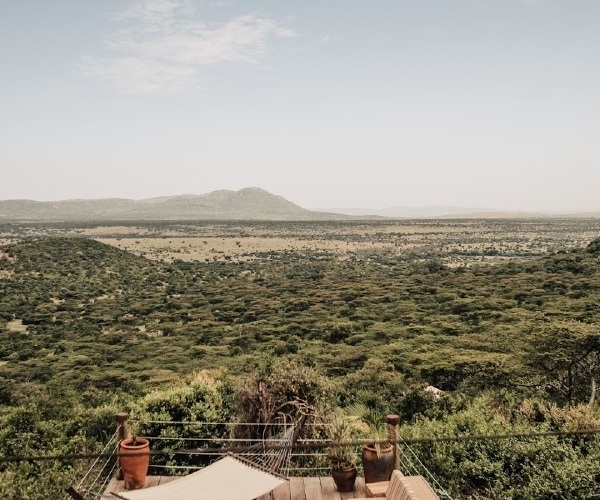 Considering this, we can decide now to become more responsible travellers when local and international travel bans are lifted. Once we can freely and safely experience Africa again, we can choose a sustainable safari approach that supports community empowerment, economic development and wildlife conservation, while only leaving a minimal to zero negative environmental footprint behind.
This all too shall pass, so we encourage you to stay inspired about your next trip to Africa. We have put together a five-point checklist that, with each tick, will get you closer to experiencing a more sustainable safari.
Find a tour operator focused on responsible travel
Many people have been incorporating sustainability into their travel style for many years now. One of the best ways to get started on the right path is by choosing a reputable tour operator that is strongly aligned to the principles of responsible tourism. The company’s passion for Africa’s health and its ability to thrive environmentally, socially and financially will shine through in the company’s ethos from the outset.
Considering this, we can decide now to become more responsible travellers when local and international travel bans are lifted. Once we can freely and safely experience Africa again, we can choose a sustainable safari approach that supports community empowerment, economic development and wildlife conservation, while only leaving a minimal to zero negative environmental footprint behind.
This all too shall pass, so we encourage you to stay inspired about your next trip to Africa. We have put together a five-point checklist that, with each tick, will get you closer to experiencing a more sustainable safari.
Find a tour operator focused on responsible travel
Many people have been incorporating sustainability into their travel style for many years now. One of the best ways to get started on the right path is by choosing a reputable tour operator that is strongly aligned to the principles of responsible tourism. The company’s passion for Africa’s health and its ability to thrive environmentally, socially and financially will shine through in the company’s ethos from the outset.
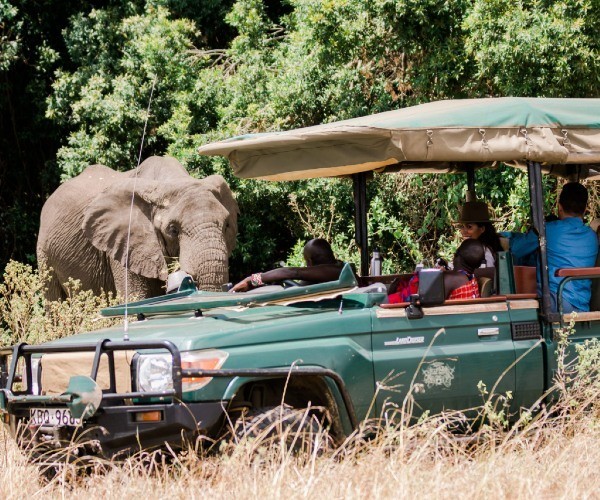 If done correctly, they will create a safari experience that is unforgettable for all the right reasons, both for you and those you visit. Your trip will bring substantial and long-lasting value to them just through paying the park management and wildlife conservation fees as well as lodging at safari accommodation that employs staff from local communities and pays them a fair wage.
Verify the safari camp’s sustainability credentials
With so many camps and lodges to choose from, picking your accommodation for a sustainable safari can be daunting. You will need to take a closer look at the various properties that fall under the banner of sustainability and validate those that truly carry out this philosophy in practice. One way to narrow your options down is by researching and verifying the sustainability status of the accommodation you are considering booking.
If done correctly, they will create a safari experience that is unforgettable for all the right reasons, both for you and those you visit. Your trip will bring substantial and long-lasting value to them just through paying the park management and wildlife conservation fees as well as lodging at safari accommodation that employs staff from local communities and pays them a fair wage.
Verify the safari camp’s sustainability credentials
With so many camps and lodges to choose from, picking your accommodation for a sustainable safari can be daunting. You will need to take a closer look at the various properties that fall under the banner of sustainability and validate those that truly carry out this philosophy in practice. One way to narrow your options down is by researching and verifying the sustainability status of the accommodation you are considering booking.
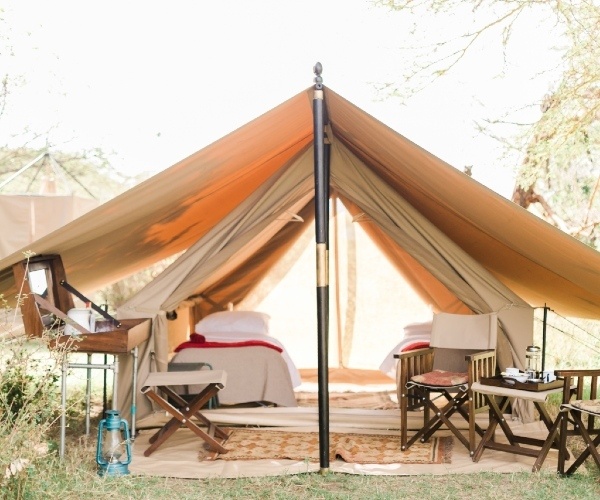 A safari property’s genuine, long-term commitment to and investment in sustainability can be proven by ecotourism certifications and memberships to internationally recognized institutions like the Global Sustainable Tourism Council and Pack for a Purpose. If the camp you have fallen in love with has been recognized for its sustainability practices on major tourism platforms like The Safari Awards and the World Travel Market, then you are even further assured that this is one of the best choices to make your safari a responsible one.
Research the camp’s wildlife conservation commitment
For a safari camp to be affiliated to such prestigious international organizations and be the recipients of equally impressive awards, they need to be leaders in wildlife conservation and environmental protection. Combining the local guides’ knowledge of the ecosystem of the area with cutting edge technological developments and support of other stakeholder groups, the camp can secure the park or reserve from poachers, mitigate conflict between community partners and wildlife, and preserve the natural habitat.
A safari property’s genuine, long-term commitment to and investment in sustainability can be proven by ecotourism certifications and memberships to internationally recognized institutions like the Global Sustainable Tourism Council and Pack for a Purpose. If the camp you have fallen in love with has been recognized for its sustainability practices on major tourism platforms like The Safari Awards and the World Travel Market, then you are even further assured that this is one of the best choices to make your safari a responsible one.
Research the camp’s wildlife conservation commitment
For a safari camp to be affiliated to such prestigious international organizations and be the recipients of equally impressive awards, they need to be leaders in wildlife conservation and environmental protection. Combining the local guides’ knowledge of the ecosystem of the area with cutting edge technological developments and support of other stakeholder groups, the camp can secure the park or reserve from poachers, mitigate conflict between community partners and wildlife, and preserve the natural habitat.
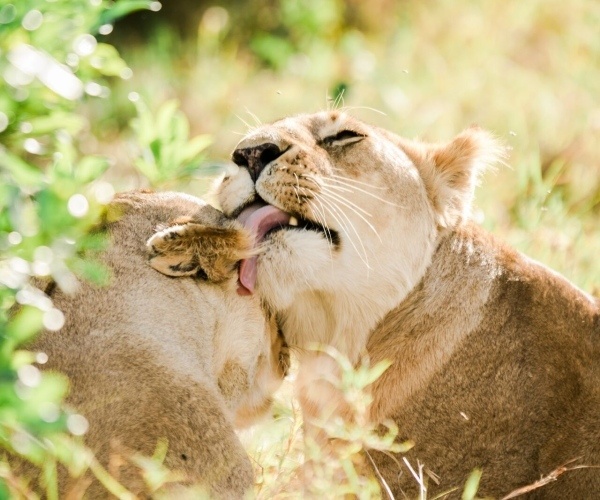 The protection of natural spaces and the wild residents that call them home is not only possible, it is necessary. This is particularly so for areas that have unique ecosystems, incredible diversity in mammals, birds and vegetation, and those that are part of broader ecological processes. For instance, protecting the route that up to 2.5 million wildebeest, zebra and other plains game journey across annually between Kenya’s Maasai Mara Game Reserve and several of Tanzania’s wilderness areas is crucial to this major ecological process.
Ask about the camp’s community investment
For a truly sustainable African safari, you will need to find out how your chosen tour operator and accommodation supports community development, social entrepreneurship and economic empowerment. All safari destinations across Africa are home to groups of indigenous people who have lived on that land for centuries as well as people who have come from elsewhere to become part of neighbouring villages and towns. The health and prosperity of these communities is equally important as that of the wildlife in the parks they live within or next to.
The protection of natural spaces and the wild residents that call them home is not only possible, it is necessary. This is particularly so for areas that have unique ecosystems, incredible diversity in mammals, birds and vegetation, and those that are part of broader ecological processes. For instance, protecting the route that up to 2.5 million wildebeest, zebra and other plains game journey across annually between Kenya’s Maasai Mara Game Reserve and several of Tanzania’s wilderness areas is crucial to this major ecological process.
Ask about the camp’s community investment
For a truly sustainable African safari, you will need to find out how your chosen tour operator and accommodation supports community development, social entrepreneurship and economic empowerment. All safari destinations across Africa are home to groups of indigenous people who have lived on that land for centuries as well as people who have come from elsewhere to become part of neighbouring villages and towns. The health and prosperity of these communities is equally important as that of the wildlife in the parks they live within or next to.
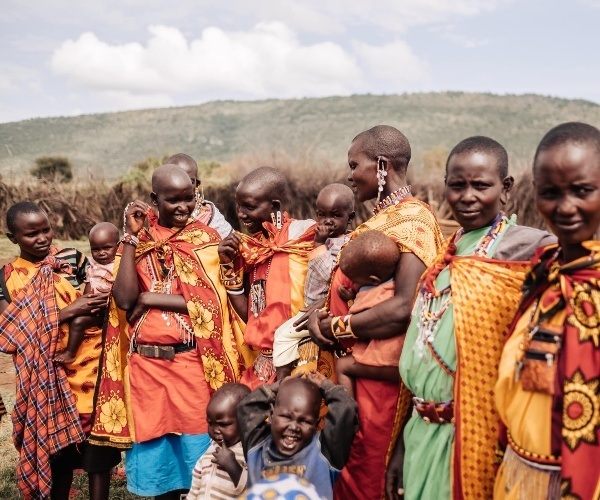 Safari camps and lodges depend very much on the wilderness, communities of people and wildlife surrounding their immediate location and the broader country within which they operate. Properties that work together with these community partners by empowering and supporting each other have a better chance of ensuring that all stakeholders benefit in a meaningful way throughout the process.
When there are opportunities for guests to visit a community that the camp works with, this should be a time for you and other guests to engage and learn from those with important local knowledge. Guests should be encouraged to buy locally-grown food and hand-made souvenirs from markets as this helps to empower socio-economic development within the community.
Take personal responsibility for your travel practices
While the ultimate goal of sustainable tourism is to transform the travel and tourism industry worldwide to undertake the practices mentioned above, there is also an essential role to be played by each traveler in their personal capacity. If every traveler plays their part, there will be a ripple effect large enough to gradually change this industry.
Safari camps and lodges depend very much on the wilderness, communities of people and wildlife surrounding their immediate location and the broader country within which they operate. Properties that work together with these community partners by empowering and supporting each other have a better chance of ensuring that all stakeholders benefit in a meaningful way throughout the process.
When there are opportunities for guests to visit a community that the camp works with, this should be a time for you and other guests to engage and learn from those with important local knowledge. Guests should be encouraged to buy locally-grown food and hand-made souvenirs from markets as this helps to empower socio-economic development within the community.
Take personal responsibility for your travel practices
While the ultimate goal of sustainable tourism is to transform the travel and tourism industry worldwide to undertake the practices mentioned above, there is also an essential role to be played by each traveler in their personal capacity. If every traveler plays their part, there will be a ripple effect large enough to gradually change this industry.
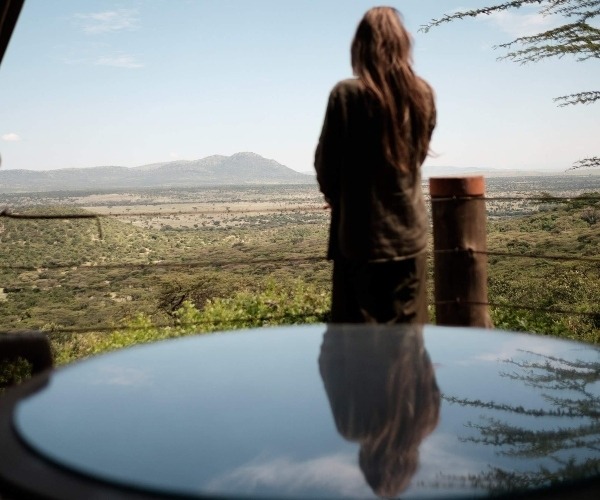 Firstly, as more people ask for tour operators, camps and lodges to align with these sustainable safari practices, the more these major role players will be forced to take their business in this direction. Secondly, being a responsible traveler means to be conscious and respectful throughout your experience as you meet people of different cultures to yours, encounter them for the first time and decide where to shop.
This checklist is in no way an exhaustive guide to a sustainable African safari. Hopefully it does, however, serve to inspire your next safari to be one centered on the people, wildlife and environment in your chosen destination in Africa. Please share with us your experiences, thoughts and ideas around the practice of sustainability in travel.
Calvin Cottar is Director and Owner at Cottar’s 1920s Safaris. Cottar’s 1920s Safaris is an award-winning luxury 1920s safari camp and private bush villa located in the famous ‘seventh’ natural wonder of the world, the Maasai Mara in Kenya, and owned and managed by the oldest established and continuing safari family in Africa.
If you would like to be a guest blogger on A Luxury Travel Blog in order to raise your profile, please contact us.
Firstly, as more people ask for tour operators, camps and lodges to align with these sustainable safari practices, the more these major role players will be forced to take their business in this direction. Secondly, being a responsible traveler means to be conscious and respectful throughout your experience as you meet people of different cultures to yours, encounter them for the first time and decide where to shop.
This checklist is in no way an exhaustive guide to a sustainable African safari. Hopefully it does, however, serve to inspire your next safari to be one centered on the people, wildlife and environment in your chosen destination in Africa. Please share with us your experiences, thoughts and ideas around the practice of sustainability in travel.
Calvin Cottar is Director and Owner at Cottar’s 1920s Safaris. Cottar’s 1920s Safaris is an award-winning luxury 1920s safari camp and private bush villa located in the famous ‘seventh’ natural wonder of the world, the Maasai Mara in Kenya, and owned and managed by the oldest established and continuing safari family in Africa.
If you would like to be a guest blogger on A Luxury Travel Blog in order to raise your profile, please contact us.Did you enjoy this article?
Receive similar content direct to your inbox.

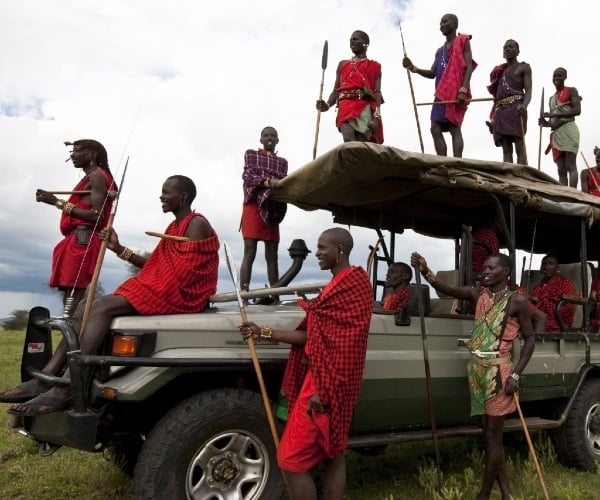

You are getting us to ask good questions. Maybe it’s time for an Environmental TripAdvisor? Some sort of website where travellers review how sustainable and environmentally friendly tourist destinations are. Maybe some IT guru with time on their hands could create one?
Hey, that’s actually a really great idea. I know there are plenty of areas around the world that could benefit from more awareness regarding sustainability and environmentally friendly tourist destinations. I always get a good dose of that when I come to this website!
Thanks for this Ivor and John. It would be good for a Green TripAdvisor or, better still, for lodges and camps etc. to be pushed by their clients to become more environmentally-friendly, sustainable and responsible. What do you think?
The current situation is beyond awful but it’s definitely a pause for thought on the things we take for granted, the positive impact it’s had on the environment, and so on. I imagine the way we live generally could, and perhaps should, change after this, hopefully for the better. I definitely think there’s been more impetus on eco friendly travel and eco friendly credentials of accommodation over the last two years, so it’s logical this should continue to be of continuing growing importance. What I’ve been finding is that it’s not enough to read that a provider is ‘sustainable’ or a property is ‘eco friendly’, you want to know how, you need some specifics for what they’re doing, like you say with verifying the sustainability credentials. Excellent points too about checking what they’re doing for the wildlife and the community, because I’d like to think that, as a traveller, I’m part of the solution and not the problem, and if we can give something back with our tourism then that would be amazing.
We can all play a part even indirectly by taking responsibility over our choices of what providers we use and where we stay. Brilliant post, a very good reminder on the importance of sustainability with safaris and wider travel generally.
Firstly, yes, the criteria for sustainable travel and eco-credentials for camps and lodges has to, in future, be hardened down to concrete and hard metrics.
For instance, each room in a lodge should pay conservancy lease or easements for wild habitat in the greater ecosystem. This way, tourism / wildlife out competes other land uses, stopping the main driver of habitat loss and poaching- conversion of land to agriculture.
Secondly, it’s not that we shouldn’t visit parks and reserves, we should! But on a daily or camping basis only. And when we do visit and pay entry fees to national parks and reserves, these fees should go to the landowners in the greater ecosystem.
Thirdly, the huge number of travel agents and destination marketing companies selling agencies have to rethink their strategies. They need to structure trips so that a guest is doing the planet better by traveling than not travelling.
Finally, members of the buying public are main change agent in making tourism become more sustainable. It comes down to awareness and asking the right questions. For instance, ask your agent what percentage of profits and which conservation area do they support?
Great insights. The situation is worse in Uganda, we have suggested all the times they ban any single use, disposable items from any safari destination but in vein. Imagine going to national park and come across a plastic bottle.
I am even going to share this article in our tour operators group never know, they may like it too.
Good work
I really admire safari operators and accommodation that don’t just think of how they can profit from their services. Sustainable safaris are a must as it is important that the wildlife and all that surrounds it are taken care of. Being safe is first. And an important thing for tourists as well, is a tour operator who is knowledgeable and experienced and at the same time knows how to guarantee the safety of the guests. The camps are also an important thing to consider because that is the place where you can rest and spend the time to relax a bit after all those wonderful adventures in the safari. Care for wildlife is a top priority and the people who manage the safari should monitor all the animals regularly for them to be protected and safe from poachers and such.
Hi Cameron
The three pillars of safari tourism are all interconnected. Without natural environments and the wild residents they home, there would be no safari industry, thus no need for tour operators and property. The latter then also provide funds to manage the national parks and game reserves as well as provide adequate conservation of wildlife. And, of course, neighbouring communities play a vital role in all these aspects. They are all necessary for the success of each other.
Stay safe.